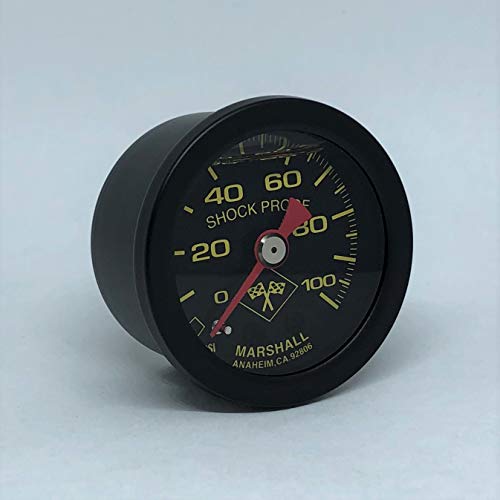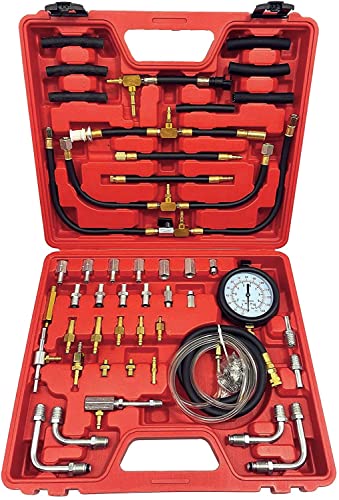There’s nothing quite as frustrating as a vehicle that just doesn’t feel right – maybe it’s the hesitation when you accelerate, the persistent check engine light, or the increasingly difficult cold starts. I’ve been there, pulling my hair out trying to diagnose what felt like an elusive problem. It quickly became clear that simply ignoring these symptoms wasn’t an option; left unaddressed, minor issues could spiral into costly breakdowns or even significant engine damage. In situations like these, having a reliable diagnostic tool would have been incredibly helpful, allowing me to pinpoint the root cause of the issue swiftly and accurately. The need for precision in measuring critical engine parameters, like fuel pressure, is paramount to maintaining a healthy vehicle.
- 1.5" Fuel Pressure Gauge, 0-100 PSI, 1/8" NPT center back connection
- Black Dial, Red Pointer, Liquid Filled, Black Case and Bezel
- Satisfaction Guaranteed: We take care of all issues with a replacement or refund within 12 months.
Key Considerations Before Investing in a Fuel Pressure Gauge
A fuel pressure gauge is an indispensable tool for anyone serious about diagnosing and maintaining their vehicle’s fuel system. It quickly helps identify common issues like a failing fuel pump, clogged fuel filter, or leaky injectors, which manifest as poor engine performance, reduced fuel economy, or even non-starts. An ideal customer for this category of product is the DIY mechanic, the automotive enthusiast, or anyone who wants to save money on shop labour by performing their own diagnostics. If you’re someone who enjoys troubleshooting and understanding the mechanics of your vehicle, a reliable fuel pressure gauge is a wise investment.
However, if you have absolutely no mechanical inclination, prefer to leave all vehicle maintenance to professionals, or are looking for a permanent, in-dash monitoring solution, a standalone diagnostic gauge might not be your primary need. In such cases, a professional mechanic’s services are more appropriate, or perhaps a more advanced OBD-II scanner that provides digital readouts for various sensors, though it may not offer the direct, real-time fuel pressure reading precision of a dedicated gauge. Before purchasing any fuel pressure gauge, consider the PSI range you need for your specific vehicle, the connection type (NPT is common), whether you prefer liquid-filled for stability or dry for simplicity, the material quality for durability, and the overall accuracy and readability of the dial. Your choice should align with your diagnostic needs and the specific demands of your vehicle’s fuel system.
- UNIVERSAL FUEL PRESSURE TESTER: This pressure tester kit by Orion Motor Tech includes everything you need to quickly and easily check fuel pump pressure on most gasoline vehicles from Chevrolet, Ford,...
- 【Universal Design】:Fuel pressure Tester kit suits a variety of gasoline engines on car, truck, SUV, Motorcycle, ATV, RV, etc (Bosch, CIS Jetronic, Throttle Body System on GM vehicles excluded),...
- 【Fuel Injection Test Gauge Kit】: Fitted with 90mm gauge having two scales (psi and bar), reading from 0~140psi and 0~10bar
Introducing the Marshall MNB00100 Fuel Pressure Gauge
The Marshall MNB00100 Fuel Pressure Gauge is a compact, robust instrument designed to give you precise readings of your fuel system’s pressure. It promises accurate and stable measurements, helping you diagnose fuel delivery issues with confidence. When you purchase this Marshall fuel pressure gauge, you receive the 1.5-inch gauge itself, featuring a black dial with a red pointer, encased in a durable black case and bezel. It comes equipped with a 1/8″ NPT center back connection, a standard fitting that makes it versatile for many applications. Marshall has long been a trusted name in automotive instrumentation, known for producing reliable and accurate gauges, and the MNB00100 continues this tradition. While there are many cheaper, unbranded alternatives on the market, Marshall’s reputation for quality often translates to better longevity and accuracy compared to generic options. This specific gauge is ideal for the home mechanic or enthusiast who needs a reliable, portable tool for spot-checking fuel pressure without the need for a complex setup. It’s less suited for those seeking a permanent, dashboard-mounted gauge for continuous monitoring, where larger, perhaps electrically-driven units might be preferred.
Here’s a quick rundown of its pros and cons:
Pros:
* Highly Accurate: Provides precise 0-100 PSI readings crucial for diagnostics.
* Liquid-Filled Design: Dampens vibrations for steady, easy-to-read measurements.
* Durable Construction: Made with a copper alloy for longevity and resilience.
* Compact Size (1.5″): Fits easily into tight engine compartments.
* Clear Readability: Black dial with a contrasting red pointer ensures quick and accurate visual checks.
Cons:
* Potential for Liquid Leakage: Some isolated reports mention fluid issues over time or upon delivery.
* Analog Display Only: Lacks digital precision or data logging capabilities for advanced users.
* Not Meant for Permanent In-Cabin Mounting: Primarily designed for diagnostic testing rather than continuous dashboard monitoring.
Diving Deep: Features and Their Practical Benefits
Having relied on the Marshall MNB00100 Fuel Pressure Gauge for a significant period, I can confidently delve into the specific features that make this tool a valuable asset in any DIY mechanic’s arsenal. From its fundamental design to its practical application, each element contributes to its overall effectiveness.
Precise 0-100 PSI Range and Diagnostic Accuracy
The most critical aspect of any fuel pressure gauge is its ability to provide accurate readings within a relevant range. The Marshall MNB00100 Fuel Pressure Gauge, with its 0-100 PSI range, covers the vast majority of automotive fuel systems, from older carbureted engines to modern fuel-injected systems. Most vehicles operate within a 30-80 PSI range, so having a gauge that can accurately read across this spectrum, and even slightly beyond, is essential for comprehensive diagnostics.
Why is this accuracy so important? An engine’s performance is highly dependent on consistent and correct fuel pressure. If the pressure is too low, the engine might starve for fuel, leading to misfires, hesitation, a lack of power, or even a no-start condition. A weak fuel pump, a clogged fuel filter, or a faulty fuel pressure regulator are common culprits. Conversely, if the pressure is too high, it can lead to an overly rich fuel mixture, causing poor fuel economy, black smoke from the exhaust, or even damage to catalytic converters. Being able to see precise fluctuations or consistent low/high readings on the MNB00100 gauge allows you to quickly narrow down potential issues, saving countless hours of guesswork and avoiding unnecessary part replacements. It provides direct, irrefutable evidence of your fuel system’s health, allowing you to move forward with targeted repairs.
The Advantage of a Liquid-Filled Design
One of the standout features of this Marshall gauge is its liquid-filled design. This isn’t just a cosmetic choice; it serves a crucial functional purpose. The internal liquid (typically glycerin) dampens the needle’s movement, preventing it from fluttering erratically due to engine vibrations, fuel pump pulsations, or sudden pressure changes within the system. Without this dampening, the needle would be constantly shaking, making it incredibly difficult to get a stable, readable measurement, especially in a running engine environment.
The benefit here is immediate clarity. When you connect the gauge, the needle settles quickly and holds steady, even when the engine is revving or under load. This stability not only makes readings easier and more accurate but also protects the internal mechanisms of the gauge from premature wear caused by constant jarring. It contributes significantly to the longevity and reliability of the tool, ensuring that it remains accurate over many years of use. This feature alone distinguishes it from many cheaper, dry gauges that can be frustratingly difficult to read.
Compact 1.5″ Black Dial with Red Pointer for Enhanced Readability
The physical design of a diagnostic tool greatly impacts its usability. The Marshall MNB00100 boasts a 1.5-inch screen size, making it remarkably compact. This small footprint is a huge advantage when working in tight engine bays where space is at a premium. You can often connect this fuel pressure gauge directly to a test port or a T-fitting without it interfering with other components.
Beyond its size, the aesthetics contribute to its functionality. The black dial provides a sharp contrast against the bright red pointer, making the numerical scale highly visible even in less-than-ideal lighting conditions or when viewing from a slight angle. The clear white markings for PSI increments are easy to distinguish, allowing for quick and confident readings. This design choice prioritizes readability and ease of use, ensuring that you can quickly ascertain the fuel pressure without straining your eyes or second-guessing the needle’s position. It genuinely “looks cool” as one user put it, but more importantly, it’s designed for practical, real-world utility.
Durable Construction: Copper Alloy, Black Case, and Bezel
Durability is key for any tool intended for automotive use, where it will inevitably encounter grease, oil, and varying temperatures. The Marshall MNB00100 Fuel Pressure Gauge is constructed with a copper alloy internal mechanism, known for its excellent corrosion resistance and strength. This ensures the precision and longevity of the gauge’s moving parts, even when exposed to fuel or harsh workshop environments.
The robust black case and bezel not only give the gauge a sleek, professional appearance but also provide significant protection for the delicate internals. This casing safeguards against minor impacts, drops, and general wear and tear that are common in a garage setting. The materials chosen reflect a commitment to building a lasting tool, one that you can rely on for years of service without worrying about it falling apart after a few uses. This rugged construction is paramount, especially for a tool that might be used frequently in varying conditions under the hood.
Standard 1/8″ NPT Center Back Connection for Versatile Use
The connection type is crucial for compatibility. The Marshall MNB00100 features a 1/8″ NPT (National Pipe Taper) center back connection. This is a widely adopted standard for pressure gauges and sensors in automotive and industrial applications. This standardization means that the gauge can easily thread into common fuel pressure test ports found on many vehicle fuel rails, or into existing adapter kits designed for fuel system diagnostics.
The center back mounting position allows the gauge to sit flush and unobtrusively when connected, providing a clear view of the dial. Its versatility means you don’t need proprietary adapters for most common diagnostic scenarios, making it a truly plug-and-play solution for many DIYers. Whether you’re building your own custom fuel pressure testing kit or simply replacing a faulty gauge on an existing setup, the 1/8″ NPT connection ensures broad compatibility and ease of integration.
Ease of Installation and Marshall’s Satisfaction Guarantee
One of the most appealing aspects of this fuel pressure gauge, especially for those new to automotive diagnostics, is its straightforward installation. Thanks to the standard 1/8″ NPT fitting, it often involves simply threading the gauge into the appropriate port on your fuel system or an adapter. There’s no complex wiring or calibration required, making it accessible even for beginners. This ease translates directly into less time spent fumbling with tools and more time diagnosing the actual problem.
Furthermore, Marshall backs this product with a satisfaction guarantee, offering a replacement or refund within 12 months for any issues. This commitment from the brand provides significant peace of mind. It signifies that Marshall stands behind the quality and reliability of their MNB00100 Fuel Pressure Gauge, giving consumers confidence in their purchase. While issues can occasionally arise, as with any manufactured product, knowing that the company is willing to address them promptly adds immense value and assures you’re investing in a product from a reputable company.
What Users Are Saying: Real-World Experiences
After sifting through numerous online reviews, it’s clear that the general sentiment towards the Marshall MNB00100 Fuel Pressure Gauge is largely positive. Many users consistently praise its accurate and stable readings, often highlighting its crisp dial and appealing design as significant advantages. Its affordability is frequently mentioned as a key factor in its appeal, making a reliable diagnostic tool accessible to a wider audience. However, a few isolated reports have noted concerns regarding the liquid fill level upon delivery or, in rare cases, eventual leakage, which can affect accuracy and necessitate a replacement. Despite these rare occurrences, the overwhelming majority of feedback confirms its straightforward installation and dependable operation, affirming its excellent value for the price.
Final Thoughts: Your Path to Fuel System Clarity
The ongoing frustration of an underperforming vehicle or the dreaded check engine light often stems from unresolved fuel system issues. Ignoring these signs can quickly escalate into more severe problems, leading to inconvenient breakdowns, costly repairs, and a significant dent in your wallet. The need for precise and reliable diagnostics is undeniable to prevent these complications and ensure your vehicle runs smoothly.
The Marshall MNB00100 Fuel Pressure Gauge is an outstanding fit to solve this critical problem. Its exceptional accuracy provides the dependable readings necessary for pinpointing fuel system faults. The liquid-filled design ensures stable, easy-to-read measurements, even under vibration, and its durable construction promises long-term reliability. For anyone looking to take control of their vehicle’s maintenance and diagnose issues with confidence, this gauge is an intelligent investment. Don’t let fuel system woes leave you stranded – Click here to check out the Marshall MNB00100 Fuel Pressure Gauge and gain clarity on your vehicle’s fuel health.
Last update on 2025-11-11 / Affiliate links / Images from Amazon Product Advertising API




